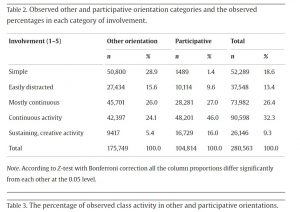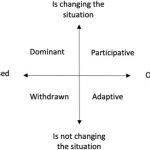 Teemu Nikkola, Jonna Kangas and Jyrki Reunamo have written an article Children’s creative participation as a precursor of 21st century skills in Finnish early childhood education and care context, which has been accepted for publication in the journal Learning and Individual Differences. The data is from Progressive Feedback observation and child evaluations. Children’s creative participation was examined using the social orientation theory together with the LI-SYC to focus on their involvement in class activities. The results showed that children’s creative participation was related to their skills and competencies, involvement, and play as a class activity. The results emphasize the significance of creative participation as an indicator of quality and learning in ECEC. Creativity is not an easy phenomenon for environments, especially in the context of education. Openness of the creative process makes it more difficult to control than a predetermined process. Uncertainty of the result and number of different ideas in creative process must be tolerated. New, different ideas may challenge the norms and achieve resistance. In creative processes, an individual must be considered to be an integral part of a complex social system. Play itself can be understood as a pathway for societal participation when considering participation and scaffolding the development of participatory skills. Scaffolding creative participation in the context and educational culture of ECEC as an open process should be conscious. The table shows the essential connection between creativity and deep learning.
Teemu Nikkola, Jonna Kangas and Jyrki Reunamo have written an article Children’s creative participation as a precursor of 21st century skills in Finnish early childhood education and care context, which has been accepted for publication in the journal Learning and Individual Differences. The data is from Progressive Feedback observation and child evaluations. Children’s creative participation was examined using the social orientation theory together with the LI-SYC to focus on their involvement in class activities. The results showed that children’s creative participation was related to their skills and competencies, involvement, and play as a class activity. The results emphasize the significance of creative participation as an indicator of quality and learning in ECEC. Creativity is not an easy phenomenon for environments, especially in the context of education. Openness of the creative process makes it more difficult to control than a predetermined process. Uncertainty of the result and number of different ideas in creative process must be tolerated. New, different ideas may challenge the norms and achieve resistance. In creative processes, an individual must be considered to be an integral part of a complex social system. Play itself can be understood as a pathway for societal participation when considering participation and scaffolding the development of participatory skills. Scaffolding creative participation in the context and educational culture of ECEC as an open process should be conscious. The table shows the essential connection between creativity and deep learning.  There should be a balanced amount of structure and autonomy in a creative process (click figure to make it bigger). Read the article at https://www.sciencedirect.com/science/article/pii/S104160802400030X.
There should be a balanced amount of structure and autonomy in a creative process (click figure to make it bigger). Read the article at https://www.sciencedirect.com/science/article/pii/S104160802400030X.